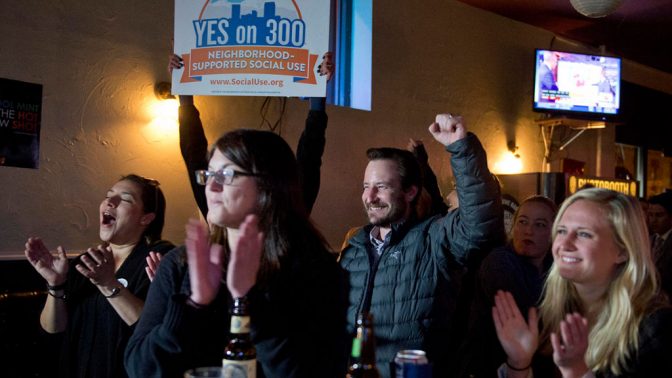Colorado Places Restrictions on Denver’s Social Use Measure

Two closely watched city-level Election Day ballot initiatives have resulted in good news for the Colorado marijuana industry, mirroring the pro-cannabis results of state-level initiatives in the rest of the country.
In Denver, Initiative 300 passed with more than 53% of the vote. The measure creates a four-year pilot program for “consumption areas” in local bars and restaurants and sets up a task force to study the impacts of such a program. Smoking cannabis will be treated like tobacco, and must take place outdoors. Vaping indoors is permitted.
Businesses must show that they have the support of the community to apply for a permit. The measure is a fix for visiting tourists and some local residents who have few options for cannabis consumption.
After officials certify the election results on Nov. 22, the government has 60 days to make applications available.
While some pro-cannabis activists disagreed with the measure, the cannabis industry and neighborhood groups supported it. “Finally, law enforcement is going to have the opportunity to tell people: ‘You know what, you can’t smoke in the park, you can’t smoke in a hotel, you can’t smoke in any number of places — but here is where you can go,” State Rep. Jonathan Singer told the Denver Post.
On Nov. 18, 10 days after the election, state officials announced some restrictions on the initiative: Any business that holds a liquor license will be barred from applying for the social-use permit. This rules out bars, many restaurants and event spaces that serve alcohol.
The new restrictions took some advocates by surprise. Still, MPP Communications Director Mason Tvert, who worked on the campaign, stated: “This doesn’t completely hinder the entire law.” Art galleries, cafes and yoga studios are just some of the businesses that could still apply to the Denver social use.
Meanwhile, in Pueblo, the city’s lax restrictions on the state’s legalization law prompted backlash from pot opponents, who introduced anti-marijuana measures to the city ballot. Voters rejected both Issue 200 and Issue 300, which would have banned commercial adult-use businesses in the city. A measure that would have increased taxes on cannabis sales was also defeated.
Armed with successes from the ballot box, industry advocates now hope to open a National Marijuana Museum in Pueblo. “It would be a wonderful economic engine to drive tourism and generate additional tax dollars, having people from outside the community shop in our stores, eat in our restaurants, sleep in our hotels,” Jim Parco, who owns the adult-use shop Mesa Organics, told a local Fox affiliate.
If you enjoyed this Freedom Leaf article, subscribe to the magazine today!

